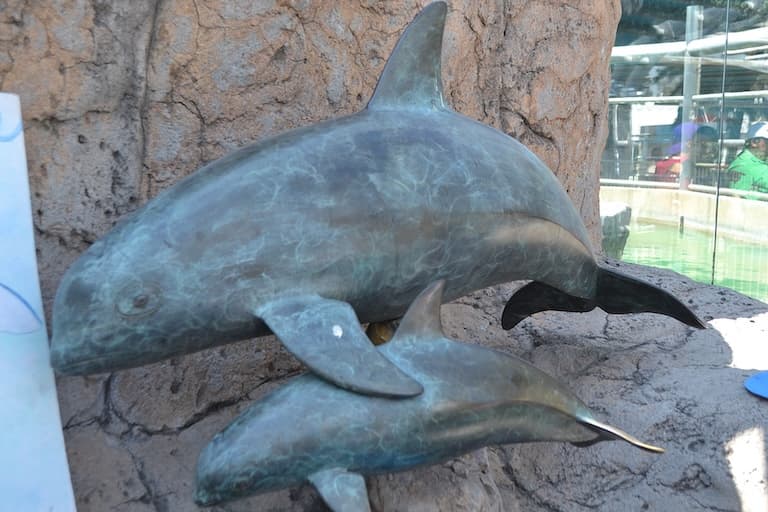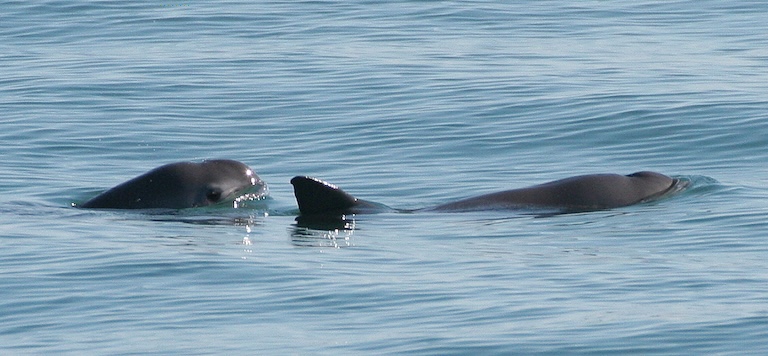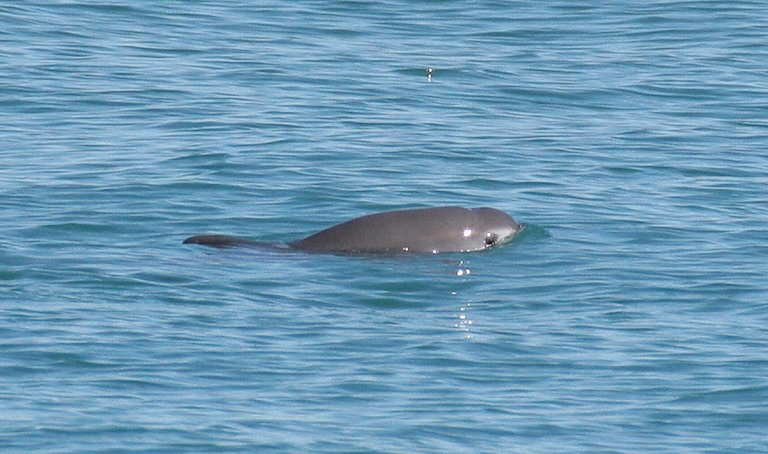Vaquita Profile
As people, we tend to leave a lot to the last minute, and then we somehow act outraged when that last minute leaves us only 60 seconds to get the job done. In 2002, footage of a dolphin called Qiqi became the last document of a live Baji River dolphin. They would be declared extinct in 2007, after a 6-year, too-little, too-late attempt to find and rescue any remaining members of the species.
And history repeats itself with alarming mimicry. The next most endangered cetacean is the adorable porpoise, the Vaquita.
And unless something very lucky happens, 60 seconds isn’t going to be nearly enough.

Vaquita Facts Overview
| Habitat: | Shallow lagoons and shorelines |
| Location: | Gulf of Mexico |
| Lifespan: | Around 20 years |
| Size: | Up to around 155 cm (5 ft) |
| Weight: | Around 54 kg (120 lb) |
| Colour: | Grey |
| Diet: | Small fish, crustaceans, squid |
| Predators: | Sharks, orca |
| Top Speed: | Slow, but burst speed of up to 15 km/h (9 mph) |
| No. of Species: | 1 |
| Conservation Status: | Critically Endangered |
Vaquitas are top of the list for Last Chance to See, and at the rate we’re going, this offer will expire any day now, but there’s a lot more to the Vaquita than just its endangered status.
This is a smart, curious and adorable marine mammal that, if all works out, could teach us a lot about both marine life and our own biases surrounding conservation.
Interesting Vaquita Facts
1. They’re warm water porpoises
Vaquitas are record breakers in a number of ways, not all bad.
They’re in the Phocoenidae family of cetaceans, which contains the dolphin-like porpoises. Porpoises aren’t all that closely related to dolphins, though, and are closer relatives of narwhals, but are found in far more diverse habitats, including freshwater.
Vaquitas are the record holders for tolerating the warmest waters of any porpoise! And they are also the record holders for being tiny.

2. They’re small
Vaquitas are the smallest porpoise, and indeed, the smallest cetacean. This makes them the smallest fully marine mammal, and all of this contributes to their status of being cute as a button to boot.
They typically grow to no more than 1.5 metres long, and unlike most mammals, the males are smaller than the females.
Vaquitas are, though, pretty low on the food chain for marine predators, and so will be hunted by sharks and other cetaceans. They can’t move all that fast, so they spend their lives hugging the shoreline, hoping to avoid detection.
3. They’re smart
As toothed whales, these little cetaceans have come with echolocation and vocal capabilities off the line.
They vocalise with clicks and whistles, both to convey their thoughts to one another and to scan their environment with sonar.
But perhaps they’re not saying very nice things, as vaquitas are perhaps the least social of all cetaceans.
4. They’re solitary
Unlike many animals that look like they do, vaquitas are mostly loners. They do hang out with their offspring as mothers, but not usually forever, and will generally be found alone or in pairs.
This isn’t a hard rule, though, and they have been spotted in groups of up to 9.
Unfortunately, if this happened today, there could only be one such group, as that would be more or less all of them.
5. Gillnets are devastating
Fishing for shrimp and small fish in the vaquita’s habitat has resulted in a high prevalence of gill nets, which are highly effective and indiscriminate means of catching fish for cheap.
Gillnetting worldwide has caused catastrophic declines in marine populations, and in some locations, it is now heavily regulated. But even where regulations exist, enforcement is sorely lacking, and illegal fishing represents a multitude of holes in the bucket of marine conservation.
These nets are almost invisible to marine animals, and fine enough that echolocation doesn’t pick them up. Being air-breathers, vaquitas that get caught in them will drown within minutes. And, tragically, this is how the population of vaquitas has been reduced to the point where some estimates count just 10 individuals remaining. 1
6. There are maybe 10 left
The shocking decline of this animal has ranked it the most endangered species on Earth. With around 10 estimated to be left in the wild, as of 2023, it remains to be seen whether the survivors have enough genetic diversity among them to create viable offspring for long enough to recover, even if we fixed their living conditions immediately.
Gillnets remain the major threat, and conservation organisations keep harping on about educating the public, but as with the majority of individuals directly responsible for wiping out endangered species, they – like everyone else – are simply trying to feed their families.
So, while educating the public is part of it, corruption in government, lack of enforcement of regulations, and most importantly, a lack of an alternative lie at the heart of this tragedy.
And the alternative will only be chosen when the market acts. Alternative fishing gear already exists, but the investment and enforcement to implement it, don’t. 2

7. If we really care, we have to act like it.
Conservation concern (specifically, the lack of it) is easy to condemn when it involves people we’ll never meet doing things we never wanted to do. Whaling is a good example of an alien concept to most of us, that’s rightfully condemned for being brutal and completely unnecessary. But the grumblings grow noticeably dimmer when the solution starts to fall on us.
Well over 100 times more whales and dolphins are killed by the fishing industry every year, by mistake, than the whaling industry kills on purpose. And that’s down to us, sending that industry into the ocean to catch us fish for us to eat. 3
As fish stocks drop, boat numbers increase to meet the quotas. More boats, more nets, more cetaceans entangled.
So, the plight of the Vaquita, as tragic and avoidable as it appears, represents one of those opportunities for those of us far away from its habitat to feel like we care. But until we adjust our spending and feeding habits, we’re complicit in very much the same thing, happening to the 165 endangered and threatened marine species in our oceans today.
Animal products in the developed world are a luxury – albeit a delicious and nutritious one – and the true cost of overconsumption is far higher than the number written on the packet. And while it might feel like there isn’t much we can do to save the vaquita, we can contribute directly to the protection of many species like it, simply by being more aware of where our money is going. 4
8. There might be hope
As much as we might pretend we’re not, we are a part of nature, and our actions provide a selective pressure on the members of our communities.
Evolution occurs when all animals without a specific trait die off, or at least reproduce less than those with it. And being intelligent animals, Vaquitas might be able to figure out how to avoid these nets if the species can survive for longer.
This would likely only happen among the most intelligent and social of their group, and so these biological traits would be heavily selected for by the fishing boats.
Population forecasts often overlook the possibility of adaptation to human presence, but nature has been doing this for a long time, and given just enough of a chance, it will adapt and overcome. If we can give them the chance to recover, vaquitas may well be able to save themselves.
And if they do, their species will forever carry an evolutionary mark from their interactions with humans. 5
Vaquita Fact-File Summary
Scientific Classification
| Kingdom: | Animalia |
| Phylum: | Chordata |
| Class: | Mammalia |
| Order: | Artiodactyla |
| Family: | Phocoenidae |
| Genus: | Phocoena |
| Species Name: | Sinus |
Fact Sources & References
- Halina Baczkowski, “Gone Fishin’: Developing alternatives to gillnets”, ABC News.
- (2022), “Survivor Vaquita Porpoises Escape Extinction Longer Than Expected”, NOAA Fisheries.
- , “The Bycatch Mitigation Initiative ”, Internation Whaling Commission.
- , “If We Want to Save the Whales, We Must Stop Eating Fish”, Live Kindly.
- (2022), “Endangered Vaquita Porpoise Not Doomed to Extinction by Inbreeding Depression ”, NOAA Fisheries.
